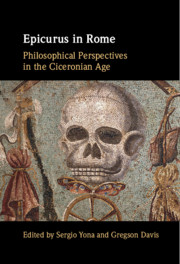Book contents
- Epicurus in Rome
- Epicurus in Rome
- Copyright page
- Contents
- Illustrations
- Contributors
- Acknowledgements
- Chapter 1 Introduction
- Part I Epicurus and Roman Identities
- Chapter 2 Sint Ista Graecorum: How to be an Epicurean in Late Republican Rome – Evidence from Cicero’s On Ends 1–2
- Chapter 3 Cicero’s Rhetoric of Anti-Epicureanism: Anonymity as Critique
- Chapter 4 Was Atticus an Epicurean?
- Chapter 5 Caesar the Epicurean? A Matter of Life and Death
- Chapter 6 Otium and Voluptas: Catullus and Roman Epicureanism
- Part II Epicurus and Lucretian Postures
- Bibliography
- General Index
Chapter 5 - Caesar the Epicurean? A Matter of Life and Death
from Part I - Epicurus and Roman Identities
- Epicurus in Rome
- Epicurus in Rome
- Copyright page
- Contents
- Illustrations
- Contributors
- Acknowledgements
- Chapter 1 Introduction
- Part I Epicurus and Roman Identities
- Chapter 2 Sint Ista Graecorum: How to be an Epicurean in Late Republican Rome – Evidence from Cicero’s On Ends 1–2
- Chapter 3 Cicero’s Rhetoric of Anti-Epicureanism: Anonymity as Critique
- Chapter 4 Was Atticus an Epicurean?
- Chapter 5 Caesar the Epicurean? A Matter of Life and Death
- Chapter 6 Otium and Voluptas: Catullus and Roman Epicureanism
- Part II Epicurus and Lucretian Postures
- Bibliography
- General Index
Summary
This chapter reexamines the question of Caesar’s putative Epicureanism. While there is no reason to believe that Caesar was a committed Epicurean, there exist tantalizing pieces of evidence that he may have adopted for himself a version of the tenet that “death is nothing to us.” These include his observation, in his speech about the convicted Catilinarians (as reported by Sallust), that death is not a punishment but the endpoint of all experience, and his late-in-life statement (versions of which are found in Cicero’s Pro Marcello and in Suetonius) that he had “lived enough.” The chapter concludes by considering the criteria scholars typically employ for gauging philosophical affiliation in antiquity, arguing for a broadening of definitions and for considering even a some-time Epicurean as Caesar as part of the history of Epicureanism.
Keywords
- Type
- Chapter
- Information
- Epicurus in RomePhilosophical Perspectives in the Ciceronian Age, pp. 72 - 86Publisher: Cambridge University PressPrint publication year: 2022
- 1
- Cited by

